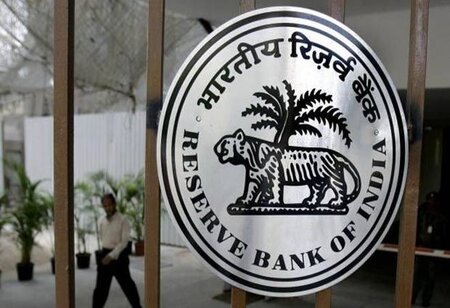Repo rate and reverse repo rate likely to remain unchanged as RBI review policy amid Omicron scare
 The Reserve Bank of India is likely to maintain the status quo on borrowing and the lending rates as the policy review committee meets on Wednesday, amid the worldwide concerns over the Omicron variant of Covid. Reuters has surveyed 50 economists who expected the RBI to hold its benchmark repo rate at 4.00%. The reverse repo rate - the interest rate that RBI borrows from the banks - is mostly expected to remain unchanged at 3.35%, though some economists predict a small rise in this rate.
The Reserve Bank of India is likely to maintain the status quo on borrowing and the lending rates as the policy review committee meets on Wednesday, amid the worldwide concerns over the Omicron variant of Covid. Reuters has surveyed 50 economists who expected the RBI to hold its benchmark repo rate at 4.00%. The reverse repo rate - the interest rate that RBI borrows from the banks - is mostly expected to remain unchanged at 3.35%, though some economists predict a small rise in this rate.
If the key lending rates remain unchanged after today's review meeting, it will be the 9th consecutive time the rates remain unchanged. The present repo rate, at which the RBI lends short-term funds to banks, is at 4 per cent. The reverse repo rate is 3.35 per cent. The last time the RBI changed the policy rate was in May 2020, when the Central bank slashed the rates to a historic low to cushion the pandemic-battered economy. Since then, there has been no change in the key rates.
"We believe, the RBI may deflate the hype around reverse repo hike in monetary policy by explaining the virtues of using reverse repo change as a pure liquidity tool and not a rate tool," Soumya Kanti Ghosh, chief economic adviser at the State Bank of India wrote in a note.
When the RBI last changed policy rates, India's GDP slumped by 24.4 per cent. Seeing a recovery, the economy posted a growth of 20.1 per cent during April-June 2021 quarter. The GDP posted a growth of 8.4 per cent in July-September 2021 quarter as against a contraction of 7.4 per cent in the year-ago period. Inflation has been within the RBI's 2-6% target range due to the cuts in taxes on fuel by central and local governments. Damage to food crops due to heavy rains and the price hikes in the telecom sector are, however, likely to push inflation up yet again. Consumer prices rose 4.48% in October from a year earlier, accelerating from September's 4.35%.
"Inflation risks cannot be dismissed as the moderation in September-October inflation is likely to be followed by an updrift back above 5.5-6% in 1Q22," said Radhika Rao, economist with DBS Bank, as quoted by Reuters.
The new variant of SARS-CoV-2, Omicron, which has brought fresh restrictions in international travel, is a potential cause of worry for the economy now.
Covid-19 new strain Omicron, first identified by South African scientists, is seen as the next big potential source of uncertainties for India's economy. First reported from South Africa, the variant has been classified as a variant of concern by the World Health organization. It is spreading fast in India with Delhi, Maharashtra, Karnataka, Rajasthan, Gujarat having reported Omicron cases.




